FROM May 4th, 2020
Today, on 5th May, we celebrate the most momentous day in a century for the midwifery profession, the International Day of The Midwife, in the first ever Year of the Midwife, as the world is currently at a standstill fighting the coronavirus pandemic, an invisible enemy that has claimed hundreds of thousands of lives. It cannot be a coincidence that today we also celebrate World Hygiene Day, a day set aside to focus on hand hygiene: that simple act of handwashing with soap. Hand washing was originally propagated by the 1840 Physician Ignaz Semmelweis to midwives at his maternity wards, as the best means to prevent and control childbed fever infection—as puerpural sepsis was then known. Thus, midwives and their clean hands have established and led life-saving and life-enhancing infection prevention and control protocols for centuries. They are at the very frontlines of health, safely guiding new life, as the first eyes to see and first hands to touch a newborn child, as they stand by women all over the world in their hours of labour, delivery and need.
And they are not alone.
Health care workers, midwives, nurses, doctors, and the entire medical profession are at the forefront to save lives because they took an oath, an oath to serve regardless of the situation. They risk their lives to save the world in these unprecedented times. It is sad that during this crisis we have pushed to the background the work that we have put in over the years in various development aspects. I fear that this progress of prominence on the work we have put in reducing maternal mortality through they essential role of the midwifery profession in standing with women to ensure safer births will be threatened by a recession of recognition, and subsequent key investments as the focus shifts.
My thoughts and prayers are with the families of all the nurses and midwives who have lost their lives to Covid-19. Their deaths are a tragedy and I join their colleagues standing with midwives around the world in mourning their beautiful souls. Each and every one of them will be remembered in our hearts as a heroine.
As always in times of crisis, the most vulnerable among us will be the ones hit hardest. Women and girls will suffer the most from this disease which has already seen a rise in gender-based violence, and rights violations of pregnant women forced into giving birth alone. Some will face child-birth complications risking the lives of both the mother and child, some will have stillbirths and some others will successfully give birth to the future leaders that will hold us accountable for the lives of their mothers lost during child birth.
The repercussions will be a constant reminder that for years we have failed and continue to fail women and children where public health is concerned.
While the world grapples in its response to COVID-19, we must be mindful that everything else still functions as before. We still require access to SRHR, women will continue to require prenatal care and safe spaces to deliver in order to reduce maternal mortality.
For years midwives have joined the battle and reduced maternal mortality ensuring that even in the poorest communities, women still had access to safe births. This is most likely one of those challenging situations for midwives in various communities.
Midwives continue to be an essential service in this crisis and we should do more than just applaud their hard work and dedication. How are we ensuring their access to protective clothing and reaching women in need. This is why on this International Day of the Midwife we are launching the We Must Applaud Midwives with WASH campaign that seeks to remind people on the importance of washing hands. As well as protecting frontline healthcare workers, WASH plays a vital role in stopping disease transmission yet two out of five healthcare facilities still lack hand hygiene facilities at points of care.
Ten Immediate WASH Actions in Healthcare facilities to Respond to COVID-19
BONUS – Preventative maintenance: Check on WASH infrastructure and undertake any necessary preventative maintenance, such as repairing possible disruptions to the water supply, storage, distribution or treatment.
There is much work to be done to ensure that the focus on WASH lasts beyond this crisis and translates into a radical change in how we understand and prioritise water, sanitation and hygiene. A key part of achieving that will be demonstrating that without good WASH standards, global health security is impossible.
Clean water is health and security, and clean hands save lives.
The ripple effect of COVID-19 runs far beyond the disease itself. We must stand in support of midwives, and the entire medical profession, to build a strong bridge between the global health community and WASH, in order to mitigate and heal the scars of this modern-day pandemic on medical workers, women, our newborns and humanity for the many years to come.
My prayers are thus reinforced as 2020 marks not only the Year of the Midwife but also heralds the Decade of Action and Delivery, designed for us to take deliberate steps towards the 2030 Sustainable Development Goals. Because midwives have supported women for centuries by delivering routine maternity care and counsel on a daily basis, we must use this opportunity to advocate louder and stronger together. We must mobilise women and policymakers to stand with midwives as midwives stand with women, newborns and their families. We must stand for the midwifery profession around the world to be recognised, respected and remunerated, and routinely provided with whole-system support.
FROM April 7th, 2020
Her Excellency Toyin Saraki, founder of The Wellbeing Foundation Africa is set to launch a powerful new e-health check tool in partnership with PocketPatientMD which will make free ‘COVID-19 Health Check’ available to all 200 million Nigerians.
The digital e-health tool – soon to be complemented by a mobile application and an offline version – will educate the public on how to stay healthy; provide users with information about whether or not they need to be tested for the Coronavirus; give public officials critical insights into vulnerable populations while providing early identification of potential COVID-19 hotspots around the country.
“This is a first-of-its-kind tool in the global fight against this pandemic. This health platform has the potential to be an effective early warning system, accelerating the response time of public health officials with limited resources, and giving every Nigerian accurate and immediate health advice”, commented Saraki who is also the Special Adviser to the World Health Organisation Africa Office Independent Advisory Group.
“Our efforts will complement the heroic efforts of the Nigeria Centre for Disease Control (NCDC) and all those working to solve this unprecedented challenge.” Dr. Chikwe Ihekweazu, Director General of the Nigeria Centre for Disease Control (NCDC), commending the efforts of The Wellbeing Foundation Africa, noted that “it is important that Nigerians have the tools that enable them to take proactive steps to protect their health” as we work hard to prevent and control the spread of COVID-19.
In the same vein, Dr. Sani Aliyu, the National Coordinator of the Federal Government of Nigeria’s Response to COVID-19 has lauded the tool as “a welcome digital innovation to help Nigerians better understand their potential risks and symptoms and direct them to government resources for any required follow-up.”
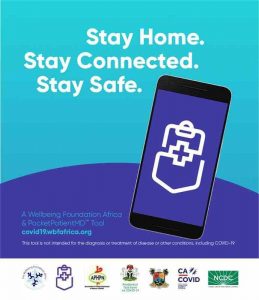
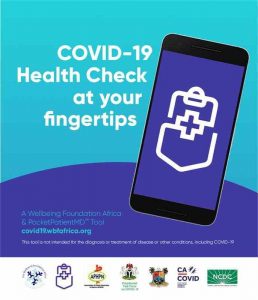
The e-health check tool works by asking users a few questions in order ascertain whether or not they need to get tested for the Coronavirus. In keeping with the Federal Government of Nigeria’s directive on staying home to curb the spread of the pandemic, the tool refers users directly to both the NCDC and state government hotlines for medical advice on how to get tested. Mark Wien, co-founder and CEO of PocketPatientMD explained that the focus of the partnership is reach “as many Nigerians as possible, and we are honoured to partner with Her Excellency Toyin Saraki who has a global reputation as an advocate for the vulnerable and a champion of better healthcare for all.”
“We can only beat Coronavirus if we work together”, added Saraki. “Misinformation has become
widespread as we respond to this pandemic and this ground-breaking approach will only be as effective as the number of people who sign up and join us.” She implored Nigerians to “take the test every 7 days, or when their symptoms change, and to ensure that they are paying close attention to, and reporting any changes in their health status not only to stay safe but also to help keep our frontline health workers safe and our public officials aware.”
The e-health check tool is available for free at https://covid19.wbfafrica.org/ and users can access real-time updates on how to stay connected, safe, and healthy during the pandemic on Instagram and Twitter @Wellbeing_PPMD, and @WellbeingPPMD on Facebook.
The Wellbeing Foundation Africa (WBFA) was founded in 2004 by Her Excellency Mrs Toyin Ojora Saraki, with the aim of improving health outcomes for women, infants and children. The Foundation combines programmes with advocacy work in Nigeria and around the world.
Through a multi-layered strategy of research, advocacy, policy development, community engagement, philanthropy and education, the Wellbeing Foundation Africa devises and implements programs which boldly deliver upon the stated objectives of United Nations Sustainable Development Goals Three, Five, and Six: Good Health and Wellbeing, Gender Equality, and Clean Water and Sanitation, respectively. All Wellbeing programs address multiple intersections between these three goals, including, but not limited to further education for midwives and frontline community health workers, improved education around water, sanitation and health (WASH) for life-saving healthy habits, advancement of early childhood mental and physical health development, and, the fundamental necessity of gender equality and the empowerment of all women and girls for a fair and just society. The WBFA supports the 8 pillars of WHO’s COVID-19 Strategic Preparedness and Response Plan.
PocketPatientMD is a free, interoperable, fully integrated medical platform currently in common African languages, available online and offline. PocketPatientMD allows physicians and patients access to medical information anywhere, anytime, safely, securely and at no cost. Stakeholders throughout the health system can easily connect to one another, leading to, cost-effective, higher quality care. PocketPatientMD works on any device (computer, phone, tablet) and with any operating system and can link to any lab, pharmacy, diagnostic centre, or application and be customised as needed.
FROM April 3rd, 2020
Following the recent call of the UNWomen supported African Womens Leadership Network Nigeria’s call for Nigerian Women to lead national responses in the age of the coronavirus, and as governments and international bodies battle to combat the coronavirus pandemic, Women In Global Health, an international non-profit organisation comprised of women leaders in global health have launched the COVID-5050 campaign for a more inclusive pandemic response.
In an opinion-editorial, ‘Fighting COVID-19 With One Hand Tied Behind Our Backs, published by the prestigious United States Council of Foreign Relations, authors, Roopa Dhatt, Ann Keeling and Toyin Saraki have advanced the opinion that for better health security, it’s time to end gender biases that keep women out of global health positions.
The authors stated:
‘Fighting COVID-19 With One Hand Tied Behind Our Backs? For better health security, it’s time to end gender biases that keep women out of global health leadership positions’
‘Whenever a high-profile health emergency breaks out or an influential commission needs experts, it seems global health reverts to the default of delivered by women, led by men. The message seems to be Health emergency! Step aside, ladies – men coming through. Although women make up 70 percent of the global health workforce, and although they work at all levels in health security—from the front lines of healthcare, to research labs, to health policy circles – they have not been represented equally in decision-making bodies that are informing our COVID-19 responses.’
‘A presidential tweet showed the first iteration of the U.S. Coronavirus Task Force was composed entirely of men. In January, just five women were invited to join the twenty-one member WHO Emergency Committee on the novel coronavirus.’
‘Unrelated to this decision, UN Secretary General Antonio Guterres made a strong public statement a few weeks later. “Women’s inequality should shame us all. Because it is not only unacceptable; it is stupid,” Guterres said in February. “Only through the equal participation of women can we benefit from the intelligence, expertise and insights of all of humanity.”’
‘There is a huge contingency of global health experts who are also women, but they are not being called upon to lead responses to this global health emergency—and this puts us all at risk. Ignoring women’s expertise and perspectives undermines health security for everyone.’
Dhatt, Keeling and Saraki further buttressed their advocacy giving ‘Six reasons why gender matters in global health security’ stating:
‘NUMBER ONE: Strong COVID-19 responses draw leaders from the entire talent pool. Women are 70 percent of the global health workforce but hold only 25 percent of senior decision-making roles. Excluding women from decision making robs health systems of the knowledge and expertise of the health workers who know these systems best. In America, which has a mostly-male Coronavirus Task Force, women have become the majority of young doctors and epidemiologists. Including women (and women from diverse groups and geographies) is about effectiveness and saving lives, not just representation. Diverse leadership groups make better, more informed decisions.’
‘70% v. 25%; Women are 70 percent of the global health workforce but hold only 25 percent of senior decision-making roles’
‘NUMBER TWO: Women are needed to fill the global shortage of health workers, which limits our ability to respond to health emergencies. As the majority of the global health and social workforce, women currently deliver health care to around five billion people. Female health workers are central to the response to any epidemic. The women health workers on the front lines of health systems do not want to be sentimentalized or celebrated as martyrs. They want to lead, they want to be listened to and they want the means to do their jobs professionally, safely and with dignity. Around half of all health workers are nurses and midwives. As the International Year of the Nurse and the Midwife, what better time than 2020 to harness the expertise and leadership potential of nurses and midwives?’
‘A 2019 WHO report concluded, however, that although women are the majority in the health and social workforce, they are clustered into lower status, lower-paid (and unpaid) roles and frequently subject to discrimination, bias and sexual harassment, which can cause them harm, limit their career growth, and cause attrition. With a projected global shortage of around forty million health and social workers by 2030—eighteen million needed in vulnerable low-income countries alone—the world must invest urgently in decent work for female health workers and enable them to fulfil their potential in all areas, including leadership. That is our best chance of retaining female health workers and scaling up the global health workforce to meet demand and the challenges of epidemics and pandemics.’
‘NUMBER THREE: Women’s political voices strengthen health systems for better health security—now and in the future. Women do not have an equal say at political level in most countries on critical issues like health budgets and universal health coverage. Globally, women are only 24 percent of the parliamentarians who make decisions on health systems funding and coverage.’
‘Countries with strong national health systems and universal health coverage are better able to cope with outbreaks and other health emergencies’
‘If women did have an equal say in political decisions on health, research suggests health systems would be stronger as female parliamentarians are more likely to give greater priority to health. This matters now more than ever; countries with strong national health systems and universal health coverage are better able to cope with outbreaks and other health emergencies. Without strong health systems that make care affordable and accessible, the most vulnerable—older people, pregnant women, the homeless, the poor, and those with pre-existing conditions and poor health status (the majority of whom are women)—will be missed by critical outbreak response activities such as widespread testing and treatment. Ultimately, this hinders containment of infectious diseases like COVID-19.’
‘NUMBER FOUR: Women and men have different, socially defined roles—and this perpetuates inequalities and weakens health security. Women carry out the majority of care for sick family and community members, and that puts women at greater risk of contracting infections like COVID-19. At the same time, women’s role as household caregivers can be leveraged for better health promotion and disease prevention/management at the family and community levels—but only if they are empowered with accurate information and the means to support the sick. COVID-19 was initially associated with a particular food market in Wuhan, China, where it is likely that the majority of traders were women. After the SARS outbreak in China in 2002, women in the same professions could have been vital allies in the cultural and behavioral change needed to avert a new viral outbreak—but clearly, this opportunity was missed. In many country contexts women are less educated than men, have less access to digital technology, and are generally overlooked as potential change agents.’
‘NUMBER FIVE: Biology and gender determinants of health affect the way disease is transmitted and progresses. Data are still being collected and analysed, but early figures from the COVID-19 outbreak in China show higher mortality among men than women, especially in older age groups.’
‘Early figures from the COVID-19 outbreak in China show higher mortality among men than women, especially in older age groups’
‘One hypothesis is that higher smoking rates by men leaves them more susceptible to respiratory viruses like SARS-CoV-2, which causes COVID-19. There are other gender-related aspects of the disease that are virtually unknown—for example, we still need to understand how COVID-19 affects pregnant and breastfeeding women in order to protect both women and the unborn child. A different virus, Zika, if contracted by a pregnant woman, does serious harm to the unborn child. Nothing similar has been reported with COVID-19, but this example show that it is critical that policy responses to epidemics examine the impact of both biological sex and the gender determinants of health.’
‘NUMBER SIX: Global health rests on the foundation of women’s unpaid work. Here’s an uncomfortable fact: women in health contribute an estimated 5 percent to global GDP ($3 trillion), of which almost 50 percent is unrecognised and unpaid. Some of the world’s poorest women and girls are effectively subsidising health systems and missing out on opportunities to enter education and the formal labor market. This is not only inequitable—it weakens global health security everywhere. Infectious diseases like COVID-19 do not respect national borders, and we are all only as safe as people in the weakest national health system. Women’s unpaid work needs to be recorded, redistributed (within the family and community) and rewarded, with women enabled to transition into paid formal sector employment. ‘We cannot fight a global health challenge like this by drawing from just half the talent pool’’
The authors, Roopa Dhatt, Ann Keeling and Toyin Saraki concluded by announcing the launch of the COVID50/50 Campaign, stating:
‘This week, Women in Global Health was proud to launch COVID 50/50, our campaign for a more inclusive pandemic responses, which includes fives asks for more gender-responsive health security. These asks build on Operation 50/50—a crowdsourced list of women health security experts, designed to be a resource for organizations looking for health security experts and media commentary on COVID-19. The current pandemic makes it clear: it’s time to acknowledge that the gender stereotypes and bias keeping women out of leadership and decision making put us all at risk. We cannot fight a global health challenge like this by drawing from just half the talent pool. We cannot win this fight with one hand tied behind our backs.’
//ENDS//
SOURCE: https://www.thinkglobalhealth.org/article/fighting-covid-19-one-hand-tied-behind-our-backs
EDITOR’S NOTE: The authors are associated with the nonprofit organization Women in Global Health.
Roopa Dhatt is the Executive Director and Co-Founder of Women in Global Health
Ann Keeling is Senior Fellow, Board of Directors, Women in Global Health
Her Excellency Toyin Saraki is Founder and President of the Wellbeing Foundation Africa, and a Steering Committee Member, African Women’s Leadership Network.
The Council on Foreign Relations (CFR), founded in 1921, is a United States non-profit think tank specializing in U.S. foreign policy and international affairs. It is headquartered in New York City, with an additional office in Washington, D.C. Its membership, which numbers 4,900, has included senior politicians, more than a dozen secretaries of state, CIA directors, bankers, lawyers, professors and senior media figures.
The CFR meetings convene government officials, global business leaders and prominent members of the intelligence and foreign-policy community to discuss international issues. CFR publishes the bi-monthly journal Foreign Affairs, and runs the David Rockefeller Studies Program, which influences foreign policy by making recommendations to the presidential administration and diplomatic community, testifying before Congress, interacting with the media, and publishing on foreign policy issues.
©2020 Council on Foreign Relations. All rights reserved. Privacy Policy and Terms of Use.
FROM March 31st, 2020
HE Toyin Ojora Saraki Global Statement – 31st March 2020
Women’s Rights In Childbirth Must Be Upheld During The Coronavirus Pandemic – HE Toyin Ojora Saraki Global Statement – 31st March 2020
‘The International Confederation of Midwives (ICM) is concerned that the human rights of women, their babies and their midwives are being violated by the introduction, in many countries, of inappropriate protocols for management of pregnancy, birth and postnatal care in response to the Covid-19 pandemic. These inappropriate protocols are not based in current reputable evidence and are harmful to the wellbeing of women and their babies’
‘As a woman, as a mother and grandmother, as Global Goodwill Ambassador to the International Confederation of Midwives since 2014, and as Founder of the Wellbeing Foundation Africa – conceived to ensure safer births – I share, endorse, and give my support to the grave concerns expressed by the ICM which represents over 1 million midwives and 600 country associations in more than 130 countries, that Women’s Rights in Childbirth Must be Upheld During the Coronavirus Pandemic.’
‘In every country and community worldwide, pregnancy and childbirth are momentous events in the lives of women and families and represent a time of intense vulnerability. The concept of “safe motherhood” is usually restricted to physical safety, but childbearing is also an important rite of passage, with deep personal and cultural significance for a woman and her family. Because motherhood is specific to women, issues of gender equity and gender violence are also at the core of maternity care. Thus, the notion of safe motherhood must be expanded beyond the prevention of morbidity or mortality to encompass respect for women’s basic human rights including respect for women’s autonomy, dignity, feelings, choices, and preferences, including the right to companionship during maternity care.’
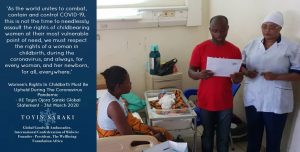
‘A childbearing woman’s right to respectful maternity care focuses specifically on the inter-personal aspects of care received by women seeking maternity services. A woman’s relationship with maternity care providers and the maternity care system during pregnancy and childbirth is vitally important. Not only are these encounters the vehicle for essential and potentially lifesaving health services, pregnant and recently pregnant women’s experiences with caregivers at this time have the impact to empower and comfort or to inflict lasting damage and emotional trauma, adding to or detracting from women’s confidence and self-esteem. I have been disturbed and dismayed by news coverage and anecdotal reports of enforced separations of recently delivered mothers from their newborns, a cruel development with no medical justification.’
‘The role of midwives as guardians of women’s rights to health has been historically evidenced since physician Ignaz Semmelweis documented the effects of hand hygiene on health in the 1800’s, noting that women delivered by midwives’ clean hands had higher survival outcomes than other patients in his hospital who perished, thereby announcing that hand hygiene, the same core infection prevention and control protocols being deployed to deliver the world from COVID today in 2020, saved lives.’
‘The WHO recommendations on caring for pregnant and recently pregnant women with COVID-19 insist that to date, there is limited data on clinical presentation and perinatal outcomes after COVID-19 during pregnancy or the puerperium, and there is no evidence that pregnant women present with different signs or symptoms or are at higher risk of severe illness, and that considering asymptomatic transmission of COVID-19 may be possible in pregnant or recently pregnant women, as with the general population, all women with epidemiologic history of contact should be carefully monitored.’
‘I urge all policymakers to remember that women’s memories of their childbearing experiences stay with them for a lifetime and are often shared with other women, contributing to a climate of confidence or doubt around childbearing.’
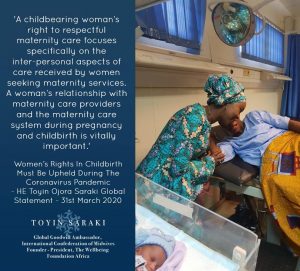
‘Pregnant women around the world are already facing a crisis of uncertainty over where and how to access much needed routine antenatal and postnatal care as health facilities shut their doors to patients except those needing care for severe respiratory symptoms of the covid pandemic – As the world unites to combat, contain and control COVID-19, this is not the time to needlessly assault the rights of childbearing women at their most vulnerable point of need, we must respect the rights of a woman in childbirth, during the coronavirus, and always, for every woman, and her newborn, for all, everywhere.’
SOURCES:
The WHO recommendations can be viewed here: https://www.internationalmidwives.org/assets/files/news-files/2020/03/who-clinical-management-of-novel-cov-march-2020.pdf
ICM’s statement and advice is available here: https://www.internationalmidwives.org/icm-news/women%E2%80%99s-rights-in-childbirth-must-be-upheld-during-the-coronavirus-pandemic.html
FROM March 23rd, 2020
COVID19 – Toyin Saraki launches #SafeSurfaceScience Challenge with London School of Tropical Medicine and Hygiene
London/Abuja
23rd March 2020
The world is paying close attention to the outbreak of novel coronavirus, following its emergence in December 2019 in Wuhan, China. With the outbreak of a novel coronavirus declared a pandemic by the World Health Organisation, people worldwide are working to address it, including Wellbeing Foundation Africa Founder Toyin Saraki who today announced the launch of the #SafeSurfaceScience Challenge with Professor Wendy Graham and a team of scientists at the London School of Hygiene and Tropical Medicine. The move, launched to coincide with World Water Day, comes as part of the effort to slow the spread of COVID-19 and focuses on the importance of cleaning surfaces, including mobile phones, in addition to cleaning hands.
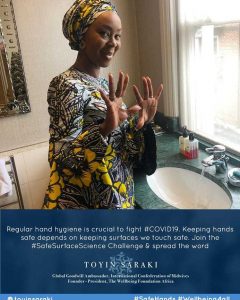 Toyin Saraki, who as well as being the Founder-President of the Wellbeing Foundation Africa is also Special Adviser to the Independent Advisory Group to the WHO Regional Office for Africa, has partnered with Wendy Graham, Professor of Obstetrics and Epidemiology at the London School of Hygiene & Tropical Medicine, to encourage best practice in homes and healthcare facilities. Professor Graham commented:
Toyin Saraki, who as well as being the Founder-President of the Wellbeing Foundation Africa is also Special Adviser to the Independent Advisory Group to the WHO Regional Office for Africa, has partnered with Wendy Graham, Professor of Obstetrics and Epidemiology at the London School of Hygiene & Tropical Medicine, to encourage best practice in homes and healthcare facilities. Professor Graham commented:
“Many germs are spread by our hands. We have known this for centuries. We have also known that surfaces which are touched by many people, like door handles, taps or taxi seats, can also harbour germs, sometimes for days. In the fight against coronavirus – we must put this knowledge to good use and take action – keep hands and surfaces clean and safe. And if we do this for our families and community, we will also reduce the spread of other germs which make us sick.”
Toyin Saraki further explains the challenge as follows: “We know that washing hands with soap and water for 20 seconds following the method shown by the World Health Organization, is the way to keep hands safe. And this must be done frequently. When in public places, try to avoid touching surfaces as much as possible, and if you have to touch – use moist wipes or hand gel afterwards, and wash your hands properly when you get home. And while you are out, make sure that you don’t touch your nose, your mouth or your eyes, because that’s how the virus finds a way into your respiratory system.”
“Keep surfaces in your home clean, too. You can do this with frequent wiping down with clean water and soap or detergent. And just as there is a right way to wash hands, so there is a way to wipe surfaces as well – use a clean cloth and wipe in one direction once, applying pressure to shift the germs, and then rinse the cloth in a separate bucket with disinfectant. One cloth; one surface; one direction. Think of all those things you touch frequently in your daily life for which you have responsibility & practice One Wipe, One Site, One Direction, including your mobile phone.”
“Join the #SafeSurfaceScience Challenge and post your challenge videos on social media! Together we can improved hygiene and help to beat COVID-19.”
Notes to Editors
The London School of Hygiene & Tropical Medicine is a world leader in research and postgraduate education in public and global health. Its mission is to improve health and health equity worldwide.
The London School of Hygiene and Tropical Medicine has launched a new course providing information on COVID-19 which is available here: https://www.futurelearn.com/courses/covid19-novel-coronavirus
FROM February 5th, 2020
Toyin Saraki is set to join UN Secretary-General Antonio Guterres, Heads of State, representatives from the private sector and senior women leaders at the African Union High-Level Meeting on Gender Equality and Women’s Empowerment. Stakeholders are gathering at the African Union Headquarters in Addis Ababa, Ethiopia, to define actions to accelerate the implementation of impactful delivery of gender equality and women’s empowerment initiatives.
Ahead of the High-Level Meeting, Mrs Saraki was lauded by the Special Envoy of the Chairperson of the African Union Commission on Women, Peace and Security, Mme Bineta Diop, for her commitment and leadership in the advancement of Gender Equality and Women Empowerment.
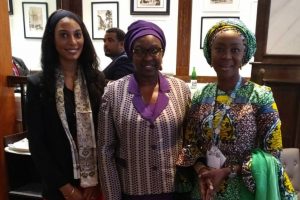
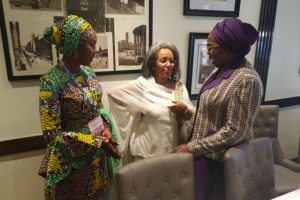
Mrs Saraki, who was integral to the conception and launch of the Nigeria Chapter of the African Women Leaders Network (AWLN) in July 2019, commented:
“I am delighted that the High-Level Meeting will afford us the opportunity to officially launch the African Women Leadership Fund (AWLF) led by the AUC and the United Nations Economic Commission for Africa (UNECA) as part of the flagship initiatives of the African Women Leaders Network (AWLN).”
“I will also join the Corporate Council on Africa (CCA) for their Business Breakfast and Roundtable on Combating Hepatitis in Africa, which will launch a political declaration to combat hepatitis. It is critical that we are able to create this effective platform for leaders across governments and the private sector to collaborate and utilise opportunities to eliminate hepatitis in Africa.”
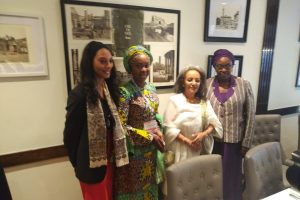
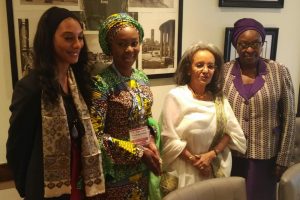
“The broader theme of the 33rd Ordinary Session of the Assembly of Heads of State and Government of the African Union – “Silencing the Guns: Creating Conducive Conditions for Africa’s Development” – demonstrates that peace and stability are the foundations of progress. There can never be health for all, or proper political representation for women, without peace.”